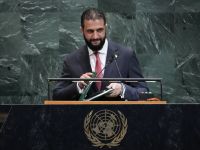Iran's defense minister said Tuesday that oil could be used to bring international pressure to help support the Palestinians, the official IRNA news agency reported.
Admiral Ali Shamkhani, in a meeting with defense officials, said oil-producing nations could bring about "concrete results" to defend the Palestinians.
"The heads of Islamic countries must use their common political, economic, diplomatic, propaganda, defense and oil capabilities ... to fulfil the needs of the Palestinian Intifada (uprising)," he said.
Iran's OPEC representative, Hossein Kazempour Ardebili, was quoted in Tuesday's press saying the powerful cartel had no plans to "punish" supporters of Israel by lowering exports to the West.
But he warned that the Organization of Petroleum Exporting Countries would be "forced to take action" if the bloodshed continues, the Hambastigi paper reported.
Israeli and Palestinian officials earlier Tuesday reached a ceasefire deal at an emergency Middle East summit in the Egyptian resort of Sharm el-Sheikh.
Iran has opposed the Middle East peace process and does not recognize the Jewish state.
Supreme leader Ayatollah Ali Khamenei has called on Muslim nations to pave the way for a holy war against Israel.
Meanwhile, Iran blasted the Middle East summit in the Egyptian Red Sea resort of Sharm el-Sheikh as a "fiasco" that "did not produce any tangible results."
In an official commentary the state IRNA news agency said that the meeting, which yielded a ceasefire deal between Israel and the Palestinians, had ended with only "vague" statements.
"In a charade aimed at covering up the fiasco, the summit published a vague declaration claiming that the two parties had agreed on a ceasefire and returned to the previous status quo," it said.
It said Egyptian President Hosni Mubarak and US President Bill Clinton "made some short statements, underlining the necessity to stop the violence immediately. But these remarks were decorative, vague and devoid of vital details."
The agreement "suggests that the two sides remain largely at odds and that the summit did not produce any tangible results."
Foreign Minister Kamal Kharazi said that the emergency peace negotiations had been "forced on the region at the moment when the Palestinians were politically weak."
He added: "The Zionist regime scores a point every time there are talks."
But Kharazi said he was optimistic about an Arab summit set to begin in Cairo on Saturday, the first such meeting in four years, to address the Middle East crisis.
He also reiterated Tehran's call for a meeting of foreign ministers of the 56-member Organization of the Islamic Conference, currently headed by Iran, to address the situation – TEHRAN (AFP)
© 2000 Al Bawaba (www.albawaba.com)







